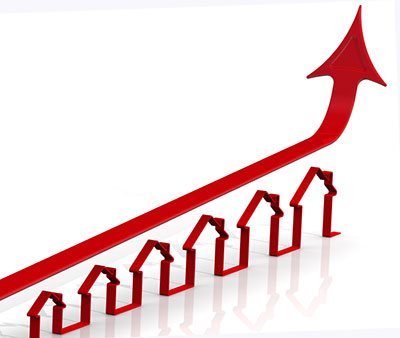Home » Uncategorised »
Annual House Price Growth Increases to 6.5%, Reports Halifax
This article is an external press release originally published on the Landlord News website, which has now been migrated to the Just Landlords blog.

Annual house price growth increased to 6.5% in the three months to December 2016, according to the latest House Price Index from Halifax.
This marks the second consecutive increase in the annual rate of growth, from a 2016 low of 5.2% in October and up from 6.0% in November. Despite the rises seen in November and December, however, the annual rate remains significantly below the 10.0% peak reached in March 2016.
At the end of last month, Halifax reported that Luton experienced the strongest annual house price growth of the year, at 19.4%.
On a quarterly basis, prices in the last three months of the year were 2.5% higher than in the previous quarter. This compares to the 0.9% change recorded in November. The quarterly rate of growth seen in December was the highest since March 2016, when it stood at 2.9%.
Following a month-on-month increase of 1.7% between November and December – the fourth consecutive monthly rise – the average house price across the country was £222,484.
Annual house price growth

Annual House Price Growth Increases to 6.5%, Reports Halifax
A Housing Economist at Halifax, Martin Ellis, says: “House prices finished 2016 strongly. Prices in the final quarter of the year were 2.5% higher than in the previous quarter. The annual rate of growth increased, rising for the second consecutive month, from 6.0% in November, to 6.5%.
“Slower economic growth, pressure on employment and a squeeze on spending power, together with affordability constraints, are expected to reduce housing demand during 2017. UK house prices should, however, continue to be supported by an ongoing shortage of property for sale, low levels of housebuilding and exceptionally low interest rates. Overall, annual house price growth nationally is most likely expected to slow to 1-4% by the end of 2017. The relatively wide range for the forecast reflects the higher than normal degree of uncertainty regarding the prospects for the UK economy this year.”
2016 housing market activity
Total UK home sales for 2016 are expected to be broadly unchanged form 2015 and 2014, at 1.2m. Sales largely stabilised in the second half of the year, with a 1% increase between October and November. Purchases in the three months from September to November were, however, 9% lower than in the same period of the previous year.
Mortgage approvals were 6% higher in the three months to November compared to the preceding three months. The number of mortgage approvals for house purchases – a leading indicator of completed property sales – slightly increased (0.2%) on a monthly basis from October to November, following a 6% rise between September and October. This suggests that home sales could increase over the coming months.
Nevertheless, supply remains incredibly low, and there are no signs that the shortage of stock is easing. The number of new instructions for November was flat, with the amount of unsold stock at a record low.
The CEO of online estate agent eMoov, Russell Quirk, comments on the data: “A late flourish for the UK housing market at the end of 2016 sees price growth remain strong, which will be welcomed by UK homeowners. It would seem positive news on house prices simply will not go away, despite the efforts of some to make us accept that the market will weaken in the wake of EU referendum angst.
“As we have said time and again, the UK housing market is fundamentally robust, bulletproof even, and we do not subscribe to the view of the naysayers that we will see price reductions in 2017. The clever money, given today’s numbers, is yet more positive news, which will serve to underpin the overall economy this year.”
He adds: “Low money costs, a demand led by an aspirational home owning culture and scant supply, will all ensure that property prices remain buoyant, regardless of those using falling prices as a scare tactic for their own personal agenda.”
Ian Thomas, CEO and co-founder of LendInvest, also responds: “While the property market proved resilient towards the end of the year, 2017 will likely see a slowdown in growth, as the impact of last year’s Stamp Duty changes are felt by investors, and the Government begins to negotiate the UK’s withdrawal from the EU.”




